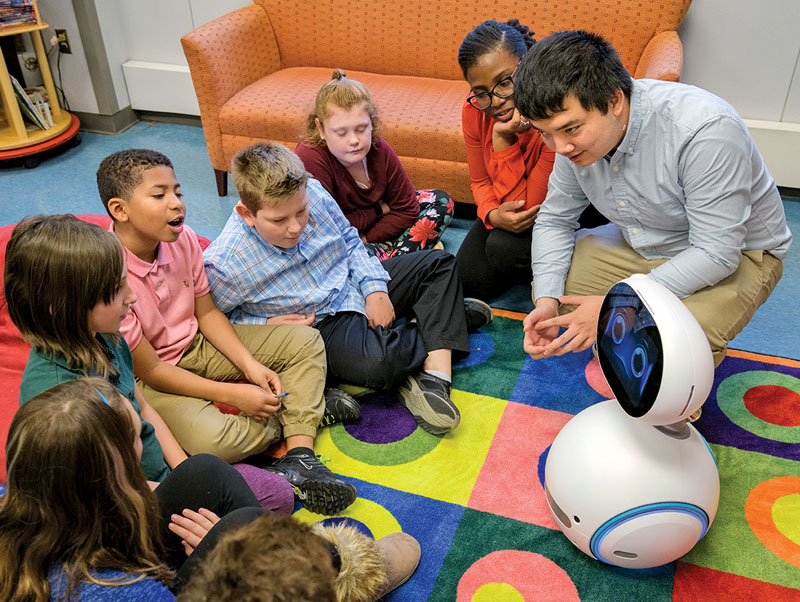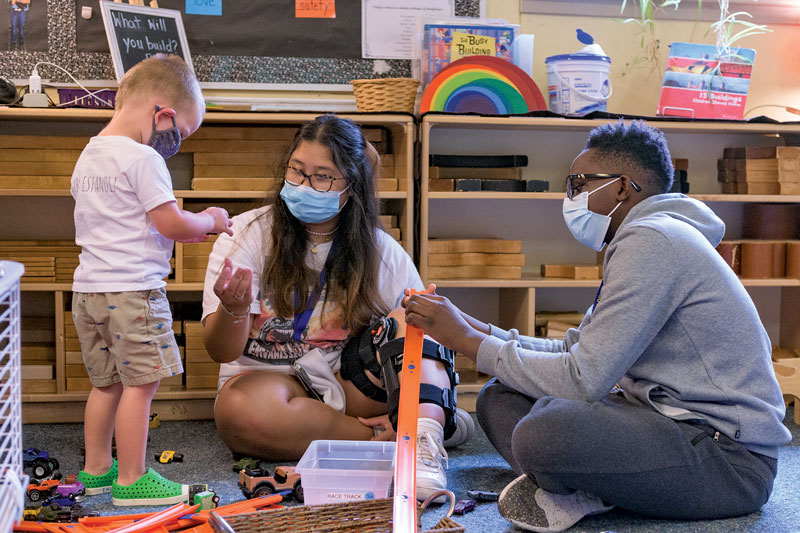


Here for every student
How UD helps strengthen and enhance education across the state
December 07, 2022
Pop quiz.
In the early days of the pandemic, most children attended school via Zoom, though a few returned to the classroom. Of the two groups—online and in person—who performed better on Delaware’s 2021 state assessment?
Counterintuitive as it may seem, the online students scored higher. Significantly so.
At first glance, the data made Jeff Klein scratch his head. But as senior policy scientist in UD’s Center for Research in Education and Social Policy, he also knew that numbers alone don’t tell the story.
“On the surface, it sounds pretty surprising,” Klein admits. “But by talking to districts and understanding their policies, we found many schools had prioritized in-person learning for students with severe disabilities or limited English language skills. So, the ones who were coming back to class were also those with greatest need.”

This approach—of finding meaning beyond the data; of partnering deeply and directly with educators on the ground; of bridging the gaps between research, policy and practice— underpins UD’s efforts to understand and enhance education at all levels across the state. Indeed, the University’s very mission to cultivate learning and develop knowledge begins right here, with this goal.
“We have a tremendous amount of research-based knowledge in instruction, curricular design, special education, disabilities studies, really all the areas that support and strengthen school success,” says Gary Henry, dean of the College of Education and Human Development. “Our job is to prepare the next generation of educators, but it’s also to ensure our expertise extends far beyond our walls.”
Through the Professional Development Center for Educators (PDCE), UD faculty and staff do just that, partnering with the Department of Education on various initiatives and working with school districts and charter schools across the state to provide systemic support, such as raised test scores, increased college application rates, enhanced literacy, culturally responsive teaching and more.

Some Delaware school districts have seen great increases in Latinx and Haitian-Creole populations, for instance, but how do you teach math when you don’t speak those languages? That’s where someone like Faith Muirhead, math expert and PDCE senior associate director, comes in. In the first half of 2022, she and her fellow team of 15 math content experts have collectively provided more than 2,000 hours of coaching to help teachers answer questions like this and more.
“The goal is to solve authentic problems,” says colleague and Associate Director of Literacy Jaime Daley, who, alongside 15 literacy specialists, has delivered more than 1,500 coaching days. “We don’t go into a school to ‘fix it.’ We go in to partner. We’re working in classrooms with a systemic view of how to support sustainable improvements.”
Then, there’s the Delaware Academy for School Leadership (DASL), which uses evidence-based best practices to support school leaders through all stages of growth, from coaching assistant principals to building and sustaining mentorship networks for school leaders to much more.

“We’re like a life vest,” says longtime director Jackie Wilson, who retired from UD last year. “We’re a reminder that there’s a community of support here.”
This past fall, those two UD units— PDCE and DASL—merged into the newly launched School Success Center (SSC), designed to ensure Delaware leaders and teachers grow together.
The SSC will bring to fruition a model of support UD partially enacted in Laurel School District, where members of PDCE and DASL worked to close substantial gaps in student performance. Before UD’s partnership, there was a 20% gap in math proficiency between Laurel’s third-eighth-grade students and the state average. While there were many factors that affected student achievement during this time, UD’s efforts helped reduce the difference to less than 2%. In reading—in this school district, which is home to the second-fastest growing population of non-English speakers—seventh graders now beat the statewide average in proficiency.
“We have a model that has worked in other states and in Delaware,” says Henry. “Now, we can put it into more systematic use.” After all, positive, systemic change is at the core of education’s future—at UD and beyond.
"Our job is to prepare the next generation of educators, but it's also to ensure our expertise extends far beyond our walls."
Dean, College of Education and Human Development
The Wilmington Learning Collaborative, for example, is an initiative launched by Gov. John Carney, BSPA84M, to streamline curriculum across a voluntary network of city schools and improve student outcomes. Its approach relies, in part, on Henry’s prior research around school improvement.
Having evaluated urban school improvement in Memphis, Atlanta and Charlotte, the dean and his research team identified teaching capacity as key to school success. This is true even in Delaware, especially now, as teaching and principal shortages plague the nation and state.
But this arena is also where UD offers some of its greatest support, growing—and diversifying—the supply of Delaware teachers by more than 100 each year. Since 2015, nearly 90% of UD graduates who took jobs as Delaware public school teachers remained in those jobs after their first year. And that first year is critical. “It’s when we see the highest turnover rates,” says Henry. The good news: By year three, the figures remain high, with 81% of UD graduates choosing to stay in Delaware public schools.
Beyond the numbers, UD is working to ensure that the educators in our schools reflect the students in their classrooms. To that end, the Teachers of Tomorrow program introduces underrepresented high school juniors and seniors to college life and to UD’s various teacher education programs through an immersive, two-week, on-campus summer institute. After the workshop, students can even take two virtual undergraduate courses at no cost: Lifespan Development and Cultural Diversity, both of which count toward the teacher education curriculum. Free to Delawareans, the donor-funded program aims to help diversify the state’s teaching workforce.

Another recent program, the Delaware Teaching Fellows, offers scholarships as forgivable loans for graduates who remain in the state and teach in a high-need public school for at least four years after graduation. Also privately funded, the fellowship is exclusive to Delaware residents.
But even non-residents find a reason to stay in state. “We successfully import some of the best and brightest students from across the country to UD,” says Henry. “And many stay here because of the connections they’ve made.”
Since 2015, more than 150 out-ofstate students remained in Delaware to teach. Jamie Forrest, EHD17, is one such transplant. Post-college, she always envisioned returning to her native New York, but this small state provided a much-needed sense of community.
“Everyone in Delaware–– professionals and legislators––really cares,” says Forrest, who has worked as a certified reading interventionist at New Castle Elementary School. “People show up. That’s my passion. I want to ensure there’s someone here for every student.”
Contact Us
Have a UDaily story idea?
Contact us at ocm@udel.edu
Members of the press
Contact us at 302-831-NEWS or visit the Media Relations website


